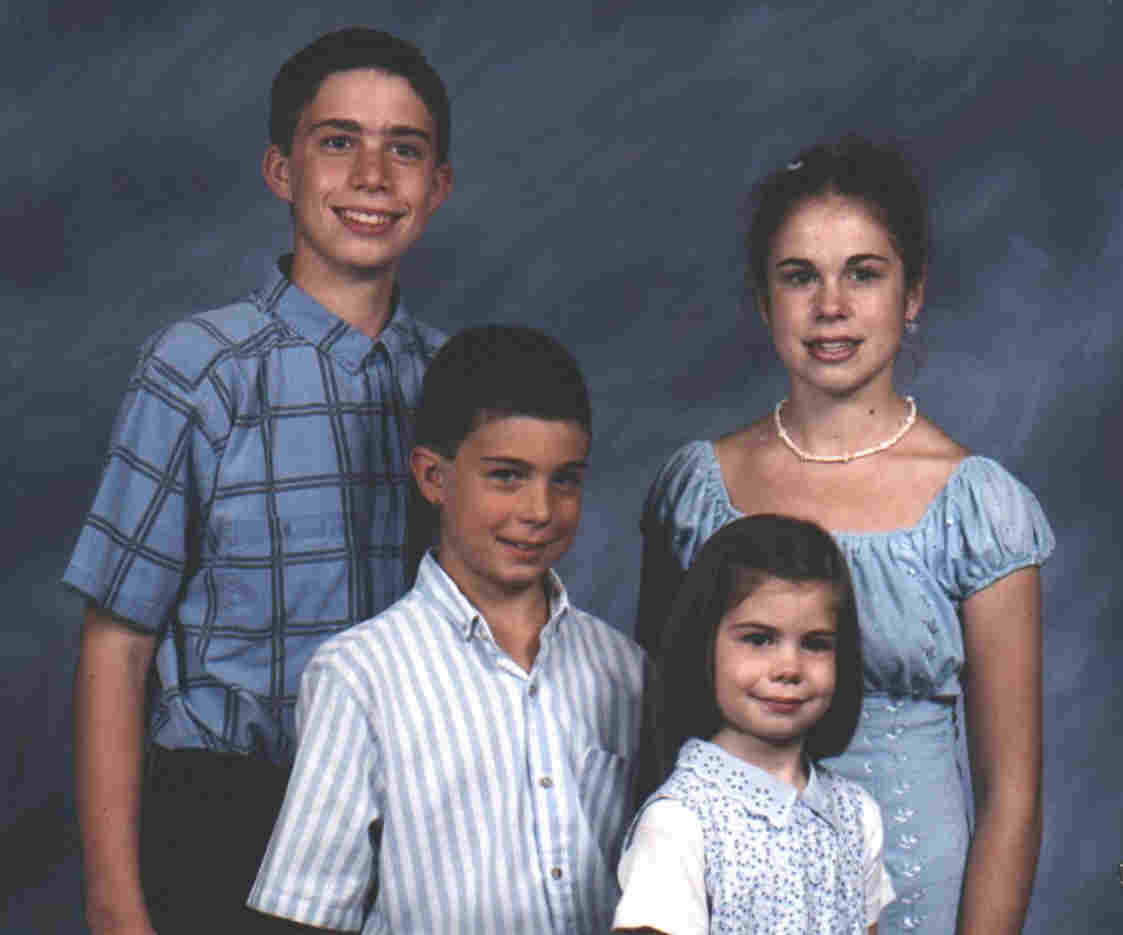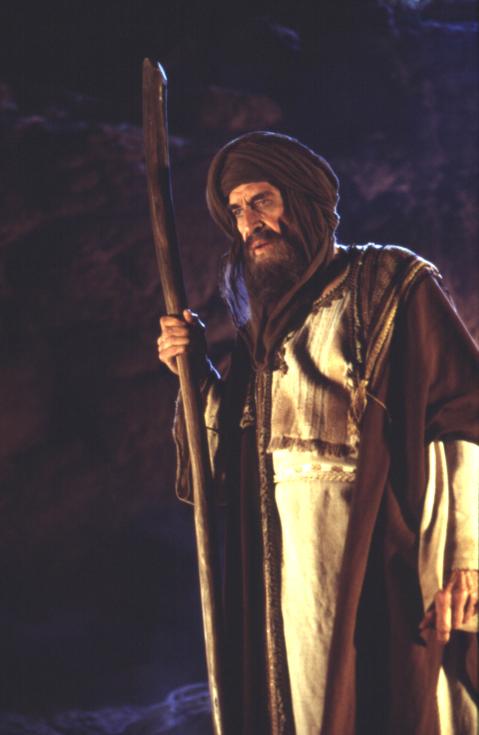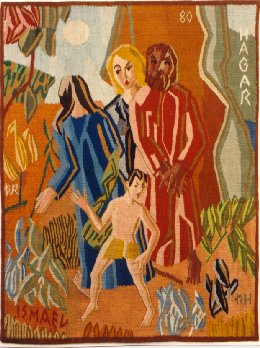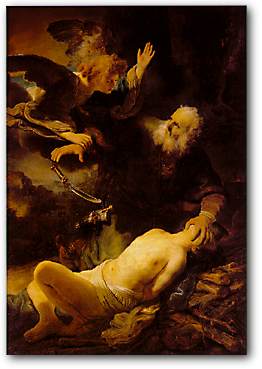
(Matthew 16:13-23)
May these words of this Peter be like a rock,
not a stumbling block!
|
|
"Who do you say
that I am?" Jesus asked. Simon Peter answered, "You
are the Messiah, the Son of the living God." And Jesus
answered, "Blessed are you, Simon son of Jonah! ... You are
Peter (petros), and on this rock (petra)
I will build my church..." Jesus then began to speak of
the rough road ahead. And Peter took him aside and rebuked him... "Get
behind me, Satan!" Jesus replied. "You are a stumbling
block..." (Matthew 16:13-23) May these words of this Peter be like a rock, |
"Hoping against hope"
Message preached March 16, 2003
Long Green Valley Church of the Brethren
Glen Arm, Maryland USA
based upon Romans
4:13-25,
Genesis 17:1-7, 15-16
(This was one of my "amble and ramble" sermons, delivered away from the pulpit without notes. The following is what I remember saying.)
"Hoping against hope, Abraham believed he would become the father of many nations." Hoping against hope.... Hope.
What do you hope for? What are your hopes?
Me? Well,
I hope this sermon goes better than the one I tossed in the trash can last night…
Every time I preach, I hope that – whether through my words or in spite of (or
beyond) them – God will speak to you what you need to hear. Funny thing
– on those occasions when folks share with me afterward about something that
touched them personally from my message, many times I wonder, "did I
actually say that?"
What do you hope for? What are your hopes?
A number of us headed to Carpenter’s Kitchen last night to serve a meal to the homeless. My hope is that it made a difference to someone. I also hope that someone might have the where-with-all to move of the streets and on to a better life. Any more, I have to think of our sister, Patty, who – once upon a time – was one of those street people. She reminds me that everyone going through the serving line is someone’s hope. And if there isn’t a family member hoping for them, they are God’s hope.
What do you hope for? What are your hopes?
Now, I
know that there are probably as many opinions about this in this room as there
are people. However, in relation to what’s happening in Iraq, I hope that
there will be no war. On the one hand, I hope that those who have been and are
being sent there to fight will come back – and not in a body bag. I’m sure
that is the hope of their own families, as well as the hope of those sent. They
probably also hope that, in their absence, things won’t fall apart back home.
On the other hand, I hope that the average person in Iraq doesn’t have to face
the terror of war. In spite of 9/11, we still don’t know in this country what
it’s like to live in a war zone. I hope they don’t have to face that hell.
What do you hope for? What are your hopes?
I hope my children grow up (they’re doing a nice job thus far). As they grow, I hope they discover what God has in store for their lives. I hope they hear and respond to God’s calling with their own "yes," and step out in faith, like Abraham and Sarah.
What do you hope for? What are your hopes?
Y’know, I bet if we were to take the time right now to write down – each of us – all our hopes on pieces of paper, and passed them to the middle, it would fill up a bushel basket. And if we were to read them all (which we wouldn’t), I think we’d find that while some of these hopes would be similar, many others would be very unique.
What do you hope for? What are your hopes?
Hope. If you have yet guessed, "hope" is the theme of our service today. It’s appropriate to talk about hope at this point in our journey toward Easter, because hope is the bridge between the crucifixion and the resurrection. It is hope that leads from the cross to the empty tomb…. Those of us who plan to stay for our Lenten program this afternoon will be exploring what the crucifixion and the resurrection mean to us personally. In our walk with Christ, we can’t have one without the other – the cross without the empty tomb, death without resurrection. The two fit together, and hope is the glue that bonds them.
In
exploring hope, it’s natural to turn to Abraham as an example of what hope is
all about, how it functions in life. Spoken of as " the
father of many nations," Abraham is also referred to as the father of
faith. "Now, wait a minute, Pete," you might be thinking. "You
said this message was about hope, and then you bring in faith. Which is
it?" Well, are hope and faith two totally separate things, or are they
intimately intertwined, more closely than crucifixion and resurrection? Aren’t
they two side of the same coin?
the
father of many nations," Abraham is also referred to as the father of
faith. "Now, wait a minute, Pete," you might be thinking. "You
said this message was about hope, and then you bring in faith. Which is
it?" Well, are hope and faith two totally separate things, or are they
intimately intertwined, more closely than crucifixion and resurrection? Aren’t
they two side of the same coin?
"Hoping against hope, Abraham believed he would become the father of many nations." It all started when God called him and his wife Sarah to leave the place they had long called "home," and venture forth in the direction toward which God pointed. In calling them forth, God gave them three promises. First, God promised them a new land, a place to call home. Third (we’ll skip over #2 for a moment), God promised to bless them that they might become a blessing to others, that others might be blessed through them.
Of course, this third promise was linked to the second one, for it was not just to be Abraham and Sarah themselves who were to be a blessing to others. It was their children and grandchildren. God promised, secondly, that this couple would have descendants. Therein lay the problem, for Abraham and Sarah as yet had no children – and none in the foreseeable future. This wouldn’t necessarily be a problem for a young couple, but Abraham and Sarah were no spring chickens. When God first called them, Abraham was 75 years old, and she wasn’t much younger.
A part of their story repeated throughout the Bible is that they were old, and infertile. And yet, "Hoping against hope, Abraham believed he would become the father of many nations." He had a long time to wait before that hope was realized. If I read it correctly, it took 25 years. Abraham was 75 when God called him and Sarah. Near his 100th birthday, the promised child finally entered this world. Talk about long-term hope!
Hope do we
understand such hope? We live in a society governed by instant gratification. If
a problem is not resolved in the course of a half hour television show, we feel
cheated. Commercials must grab our attention in ever less amounts of time if
they wish to influence our lives. Abraham hoped in a long-haul sort of way. He
kept at it for 25 years, he and his wife. How many of our hopes are long range?
Could we keep hoping that long? Perhaps the best hopes are the ones which are not immediate, which take a long time to realize. They’re also the
hardest.
which are not immediate, which take a long time to realize. They’re also the
hardest.
Lest you think that Abraham and Sarah were too perfect – after all how could you or I ever delay the realization of a hope for that long? – let me remind you that they were far from perfection. The Bible, by the way, rarely gives us unreal characters. If anything, they are all too real, some in very embarrassing ways. Take Abraham. He is no "plastic" patriarch.
After many years of wandering with God and waiting for the promise of a child to be gratified, Sarah "got real." She suggested that her husband should spend time with her slave girl, Hagar, and have a son by her. What did Abraham do? The "perfect" husband, I imagine, would respond to such a suggestion by taking his wife in his arms and assuring her that she and he were in this together, and that such a plan would just not be right. Is this what Abraham did? Hardly! This was one occasion he should not have done as his wife suggested. But he did. Willingly. Too willingly.
The result was a mess. The promise was not realized, even though Hagar did give birth to a son, Ishmael. The resulting conflict between Sarah and Hagar nearly torn this "family" apart, threatening the promise itself. You could say this conflict is still with us. Our Muslim brothers and sisters, you see, also look to Abraham as their father, and they trace their lineage through Ishmael.
Hoping
against hope, Abraham continued to believe. And eventually the promise was
realized when Sarah gave birth to a son whose very name meant
"laughter." Isaac became their pride and joy. Hope lived. There’s
more to the story, however, a part of the tale which I find very hard to read.
You see, when Isaac was a young boy growing into a man, God  asked
the impossible of Abraham. The instruction was to take Isaac on a short trip up
a hill. Along the way, I can almost imagine the giggles coming out of this child
who was named, "he laughed." There and altar was to be constructed,
and Abraham was told to bind his son and place him upon it, and sacrifice him.
asked
the impossible of Abraham. The instruction was to take Isaac on a short trip up
a hill. Along the way, I can almost imagine the giggles coming out of this child
who was named, "he laughed." There and altar was to be constructed,
and Abraham was told to bind his son and place him upon it, and sacrifice him.
I hate it this part of the story. I can well imagine Abraham’s terror (let alone, Isaac’s) as he drew his knife and prepared to take his son’s life. Every fibre of his being cried out that the blade should point toward his own chest and not his son’s. Flesh of my flesh… Hope of my hope. Abraham was asked to sacrifice that for which he had hoped so long. What if we were to take that basket filled with all of our hopes and place it on the worship center and light a match to it? What if we were called to tear up our hopes and toss them away?
As Abraham stood ready to do the unthinkable, God turned his head, and there he saw a ram. "Hear is your sacrifice," God said. And with relief, Abraham obeyed. Isaac lived. Abraham’s hope grew to be a man, and he had sons of his own. One of those sons, Jacob, himself had many sons – who became a great nation: the people of Israel, they and their descendants. The promise was realized. They entered the promised land (eventually). They were blessed and became a blessing. And we, according to the apostle Paul, are part of that family – through Abraham, the father of faith. "Hoping against hope, Abraham believed he would become the father of many nations." And he did.
What do you hope for? What are your hopes?
| online resources for this scripture text |
For commentaries consulted, see Romans. |
©2003 Peter L. Haynes